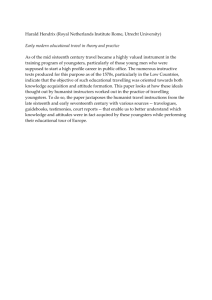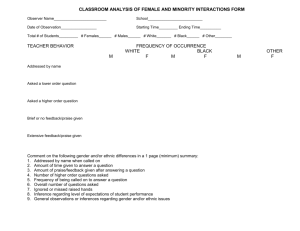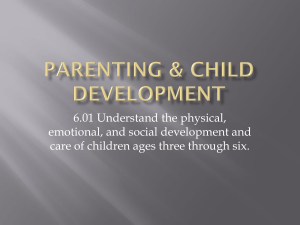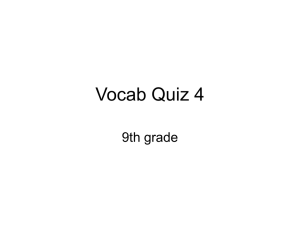boys to be able to compete on an equal basis... activity. We give plain ...
advertisement
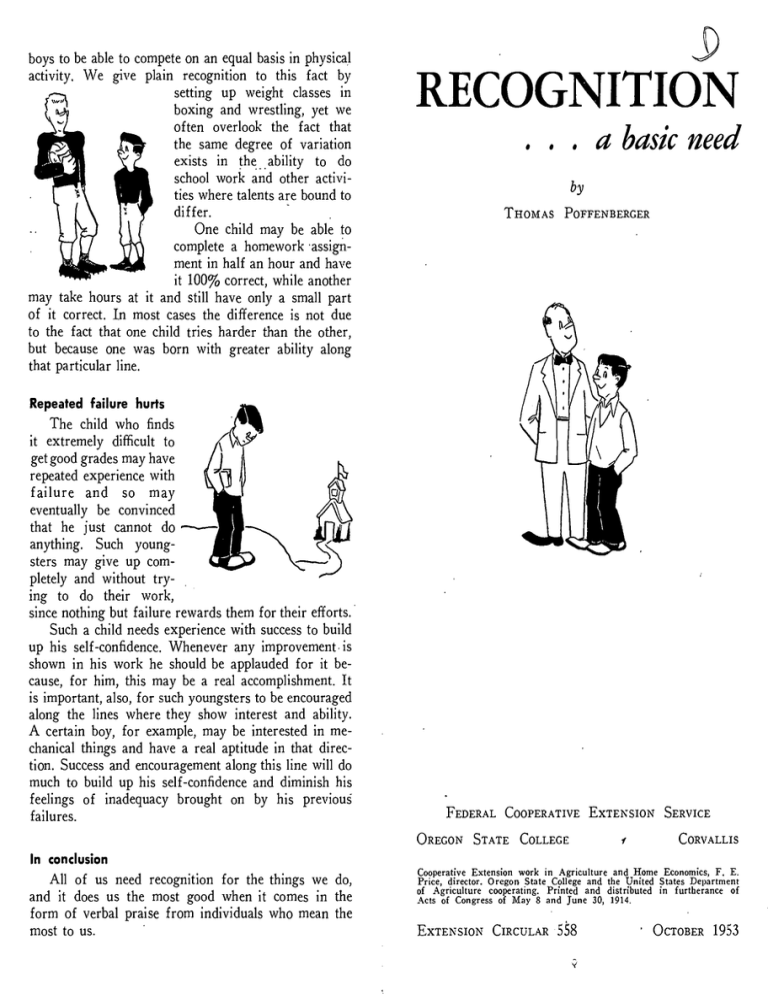
boys to be able to compete on an equal basis in physical activity. We give plain recognition to this fact by setting up weight classes in boxing and wrestling, yet we often overlook the fact that the same degree of variation exists in the ability to do school work and other activities where talents are bound to differ. One child may be able to complete a homework assignment in half an hour and have it 100% correct, while another may take hours at it and still have only a small part of it correct. In most cases the difference is not due to the fact that one child tries harder than the other, but because one was born with greater ability along that particular line. RECOGNITION . . . a basic need by THOMAS POFFENBERGER Repeated failure hurts The child who finds it extremely difficult to get good grades may have repeated experience with failure and so may eventually be convinced that he just cannot do anything. Such youngsters may give up completely and without trying to do their work, since nothing but failure rewards them for their efforts. Such a child needs experience with success to build up his self-confidence. Whenever any improvement is shown in his work he should be applauded for it because, for him, this may be a real accomplishment. It is important, also, for such youngsters to be encouraged along the lines where they show interest and ability. A certain boy, for example, may be interested in mechanical things and have a real aptitude in that direction. Success and encouragement along this line will do much to build up his self-confidence and diminish his feelings of inadequacy brought on by his previous" failures. FEDERAL COOPERATIVE EXTENSION SERVICE OREGON STATE COLLEGE Y CORVALLIS In conclusion All of us need recognition for the things we do, and it does us the most good when it comes in the form of verbal praise from individuals who mean the most to us. Cooperative Extension work in Agriculture and Home Economics, F. E. Price, director. Oregon State College and the United States Department of Agriculture cooperating. Printed and distributed in furtherance of Acts of Congress of May 8 and June 30, 1914. EXTENSION CIRCULAR 558 OCTOBER 1953 RECOGNITION . . . a basic need THOMAS POFFENBERGER Extension Human Relations Specialist Oregon State College Do YOU like a pat on the back now and then? Of course you do. Who doesn't? All of us like to be told that we are doing a good job. Such recognition makes us feel good. Children need a lot of recognition, too. It is while they are growing that they develop the concept of their own worth. If we make a child the center of attention all the time, he can get the idea that he is a pretty important person—a great deal more important than he is or ever will be. That's too bad because that kind of a person is pretty hard to get along with. On the other hand, we can give a child the feeling that he isn't worth much of anything just by withholding praise from him and always asking him to do more than he can. When this happens, it is unfortunate because he is always weighed down by the feeling of failure whether he is a failure or not. We all need recognition When a husband comes home at night and eats his meal without . K?t commenting on it, you can bet his wife gets pretty discouraged. But, if instead, he regularly remarks about her good dinners, you can be sure that she is happy cooking for him and is doing her best to turn out fine meals. Getting in the habit of praising our husbands and wives really "pays off" in warmer feelings toward each other. It "pays off" the same way with our children. But how often do we praise them for the good things they do? Instead, we just seem to assume that it's easy for kids to do the "right" thing, and so we don't say much when they do. However, we let them know in a big hurry whenever they fail to come up to our expectations! Lefs look at a study The constructiveness of praise has been, demonstrated in repeated experiments with school children. One of these experiments divided a class into three groups with both good and poor students in each. An arithmetic test was given to each group, and after it was corrected, the first group was told that they had done very well on the test. The second group was told that they had done very poorly, while nothing at all was said to the third group. The next day the test was given and afterwards the first |Ak _^ group was again praised, the sec^K) A* ond group reprimanded and the third group ignored. This process was repeated for five days in a row, and at the end of the fifth day, the increase in number of problems correct was charted for each group. Which group did the best? Of course, the one that was praised! But which group did next best? (We might think that those who were ignored would do better, but such was not the case.) It was the group which was reprimanded! One thing we human beings cannot stand is to be completely ignored. They'll get attention This need for attention is often one of the causes of delinquency. Youngsters who find they get little attention for doing the "right" things _< soon discover that they get a great deal of attention for doing what is considered wrong. Even though it is negative attention it is better than no attention at all. Teachers often find that this knowledge can be applied to help "problem" youngsters in school. If a child who is acting up is given attention with a job erasing the blackboard or as monitor, it is often the end of his more undesirable actions. No two exactly equal In giving praise and recognition it is important not to compare one child with another in any area because no two are exactly equal in natural ability. We recognize that there is considerable variation in the physical size and strength of children the same age. One boy at 16 may be 6 feet tall and weigh 180 pounds, while another may be 5 feet 2 inches and weigh 110 pounds. No one would expect these two boys to be able to compete on an equal basis in physical activity. We give plain recognition to this fact by setting up weight classes in boxing and wrestling, yet we often overlook the fact that the same degree of variation exists in the ability to do school work and other activities where talents are bound to differ. One child may be able to complete a homework assignment in half an hour and have it 100% correct, while another may take hours at it and still have only a small part of it correct. In most cases the difference is not due to the fact that one child tries harder than the other, but because one was born with greater ability along that particular line. RECOGNITION . . . a basic need by THOMAS POFFENBERGER Repeated failure hurts The child who finds it extremely difficult to get good grades may have repeated experience with failure and so may eventually be convinced that he just cannot do anything. Such youngsters may give up completely and without trying to do their work, since nothing but failure rewards them for their efforts. Such a child needs experience with success to build up his self-confidence. Whenever any improvement is shown in his work he should be applauded for it because, for him, this may be a real accomplishment. It is important, also, for such youngsters to be encouraged along the lines where they show interest and ability. A certain boy, for example, may be interested in mechanical things and have a real aptitude in that direction. Success and encouragement along this line will do much to build up his self-confidence and diminish his feelings of inadequacy brought on by his previous" failures. FEDERAL COOPERATIVE EXTENSION SERVICE OREGON STATE COLLEGE Y CORVALLIS In conclusion All of us need recognition for the things we do, and it does us the most good when it comes in the form of verbal praise from individuals who mean the most to us. Cooperative Extension work in Agriculture and Home Economics, F. E. Price, director. Oregon State College and the United States Department of Agriculture cooperating. Printed and distributed in furtherance of Acts of Congress of May 8 and June 30, 1914. EXTENSION CIRCULAR 558 OCTOBER 1953
